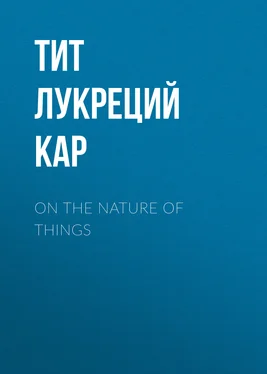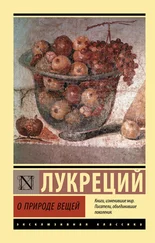Тит Лукреций Кар - On the Nature of Things
Здесь есть возможность читать онлайн «Тит Лукреций Кар - On the Nature of Things» — ознакомительный отрывок электронной книги совершенно бесплатно, а после прочтения отрывка купить полную версию. В некоторых случаях можно слушать аудио, скачать через торрент в формате fb2 и присутствует краткое содержание. Жанр: foreign_poetry, Поэзия, foreign_antique, foreign_prose, на английском языке. Описание произведения, (предисловие) а так же отзывы посетителей доступны на портале библиотеки ЛибКат.
- Название:On the Nature of Things
- Автор:
- Жанр:
- Год:неизвестен
- ISBN:нет данных
- Рейтинг книги:3 / 5. Голосов: 1
-
Избранное:Добавить в избранное
- Отзывы:
-
Ваша оценка:
- 60
- 1
- 2
- 3
- 4
- 5
On the Nature of Things: краткое содержание, описание и аннотация
Предлагаем к чтению аннотацию, описание, краткое содержание или предисловие (зависит от того, что написал сам автор книги «On the Nature of Things»). Если вы не нашли необходимую информацию о книге — напишите в комментариях, мы постараемся отыскать её.
On the Nature of Things — читать онлайн ознакомительный отрывок
Ниже представлен текст книги, разбитый по страницам. Система сохранения места последней прочитанной страницы, позволяет с удобством читать онлайн бесплатно книгу «On the Nature of Things», без необходимости каждый раз заново искать на чём Вы остановились. Поставьте закладку, и сможете в любой момент перейти на страницу, на которой закончили чтение.
Интервал:
Закладка:
And, again,
What seems to us the hardened and condensed
Must be of atoms among themselves more hooked,
Be held compacted deep within, as 'twere
By branch-like atoms—of which sort the chief
Are diamond stones, despisers of all blows,
And stalwart flint and strength of solid iron,
And brazen bars, which, budging hard in locks,
Do grate and scream. But what are liquid, formed
Of fluid body, they indeed must be
Of elements more smooth and round—because
Their globules severally will not cohere:
To suck the poppy-seeds from palm of hand
Is quite as easy as drinking water down,
And they, once struck, roll like unto the same.
But that thou seest among the things that flow
Some bitter, as the brine of ocean is,
Is not the least a marvel…
For since 'tis fluid, smooth its atoms are
And round, with painful rough ones mixed therein;
Yet need not these be held together hooked:
In fact, though rough, they're globular besides,
Able at once to roll, and rasp the sense.
And that the more thou mayst believe me here,
That with smooth elements are mixed the rough
(Whence Neptune's salt astringent body comes),
There is a means to separate the twain,
And thereupon dividedly to see
How the sweet water, after filtering through
So often underground, flows freshened forth
Into some hollow; for it leaves above
The primal germs of nauseating brine,
Since cling the rough more readily in earth.
Lastly, whatso thou markest to disperse
Upon the instant—smoke, and cloud, and flame—
Must not (even though not all of smooth and round)
Be yet co-linked with atoms intertwined,
That thus they can, without together cleaving,
So pierce our body and so bore the rocks.
Whatever we see…
Given to senses, that thou must perceive
They're not from linked but pointed elements.
The which now having taught, I will go on
To bind thereto a fact to this allied
And drawing from this its proof: these primal germs
Vary, yet only with finite tale of shapes.
For were these shapes quite infinite, some seeds
Would have a body of infinite increase.
For in one seed, in one small frame of any,
The shapes can't vary from one another much.
Assume, we'll say, that of three minim parts
Consist the primal bodies, or add a few:
When, now, by placing all these parts of one
At top and bottom, changing lefts and rights,
Thou hast with every kind of shift found out
What the aspect of shape of its whole body
Each new arrangement gives, for what remains,
If thou percase wouldst vary its old shapes,
New parts must then be added; follows next,
If thou percase wouldst vary still its shapes,
That by like logic each arrangement still
Requires its increment of other parts.
Ergo, an augmentation of its frame
Follows upon each novelty of forms.
Wherefore, it cannot be thou'lt undertake
That seeds have infinite differences in form,
Lest thus thou forcest some indeed to be
Of an immeasurable immensity—
Which I have taught above cannot be proved.
And now for thee barbaric robes, and gleam
Of Meliboean purple, touched with dye
Of the Thessalian shell…
The peacock's golden generations, stained
With spotted gaieties, would lie o'erthrown
By some new colour of new things more bright;
The odour of myrrh and savours of honey despised;
The swan's old lyric, and Apollo's hymns,
Once modulated on the many chords,
Would likewise sink o'ermastered and be mute:
For, lo, a somewhat, finer than the rest,
Would be arising evermore. So, too,
Into some baser part might all retire,
Even as we said to better might they come:
For, lo, a somewhat, loathlier than the rest
To nostrils, ears, and eyes, and taste of tongue,
Would then, by reasoning reversed, be there.
Since 'tis not so, but unto things are given
Their fixed limitations which do bound
Their sum on either side, 'tmust be confessed
That matter, too, by finite tale of shapes
Does differ. Again, from earth's midsummer heats
Unto the icy hoar-frosts of the year
The forward path is fixed, and by like law
O'ertravelled backwards at the dawn of spring.
For each degree of hot, and each of cold,
And the half-warm, all filling up the sum
In due progression, lie, my Memmius, there
Betwixt the two extremes: the things create
Must differ, therefore, by a finite change,
Since at each end marked off they ever are
By fixed point—on one side plagued by flames
And on the other by congealing frosts.
The which now having taught, I will go on
To bind thereto a fact to this allied
And drawing from this its proof: those primal germs
Which have been fashioned all of one like shape
Are infinite in tale; for, since the forms
Themselves are finite in divergences,
Then those which are alike will have to be
Infinite, else the sum of stuff remains
A finite—what I've proved is not the fact,
Showing in verse how corpuscles of stuff,
From everlasting and to-day the same,
Uphold the sum of things, all sides around
By old succession of unending blows.
For though thou view'st some beasts to be more rare,
And mark'st in them a less prolific stock,
Yet in another region, in lands remote,
That kind abounding may make up the count;
Even as we mark among the four-foot kind
Snake-handed elephants, whose thousands wall
With ivory ramparts India about,
That her interiors cannot entered be—
So big her count of brutes of which we see
Such few examples. Or suppose, besides,
We feign some thing, one of its kind and sole
With body born, to which is nothing like
In all the lands: yet now unless shall be
An infinite count of matter out of which
Thus to conceive and bring it forth to life,
It cannot be created and—what's more—
It cannot take its food and get increase.
Yea, if through all the world in finite tale
Be tossed the procreant bodies of one thing,
Whence, then, and where in what mode, by what power,
Shall they to meeting come together there,
In such vast ocean of matter and tumult strange?—
No means they have of joining into one.
But, just as, after mighty ship-wrecks piled,
The mighty main is wont to scatter wide
The rowers' banks, the ribs, the yards, the prow,
The masts and swimming oars, so that afar
Along all shores of lands are seen afloat
The carven fragments of the rended poop,
Giving a lesson to mortality
To shun the ambush of the faithless main,
The violence and the guile, and trust it not
At any hour, however much may smile
The crafty enticements of the placid deep:
Exactly thus, if once thou holdest true
That certain seeds are finite in their tale,
The various tides of matter, then, must needs
Scatter them flung throughout the ages all,
So that not ever can they join, as driven
Together into union, nor remain
In union, nor with increment can grow—
But facts in proof are manifest for each:
Things can be both begotten and increase.
'Tis therefore manifest that primal germs,
Are infinite in any class thou wilt—
From whence is furnished matter for all things.
Nor can those motions that bring death prevail
Forever, nor eternally entomb
The welfare of the world; nor, further, can
Those motions that give birth to things and growth
Keep them forever when created there.
Thus the long war, from everlasting waged,
With equal strife among the elements
Goes on and on. Now here, now there, prevail
The vital forces of the world—or fall.
Mixed with the funeral is the wildered wail
Of infants coming to the shores of light:
No night a day, no dawn a night hath followed
That heard not, mingling with the small birth-cries,
The wild laments, companions old of death
And the black rites.
Интервал:
Закладка:
Похожие книги на «On the Nature of Things»
Представляем Вашему вниманию похожие книги на «On the Nature of Things» списком для выбора. Мы отобрали схожую по названию и смыслу литературу в надежде предоставить читателям больше вариантов отыскать новые, интересные, ещё непрочитанные произведения.
Обсуждение, отзывы о книге «On the Nature of Things» и просто собственные мнения читателей. Оставьте ваши комментарии, напишите, что Вы думаете о произведении, его смысле или главных героях. Укажите что конкретно понравилось, а что нет, и почему Вы так считаете.











